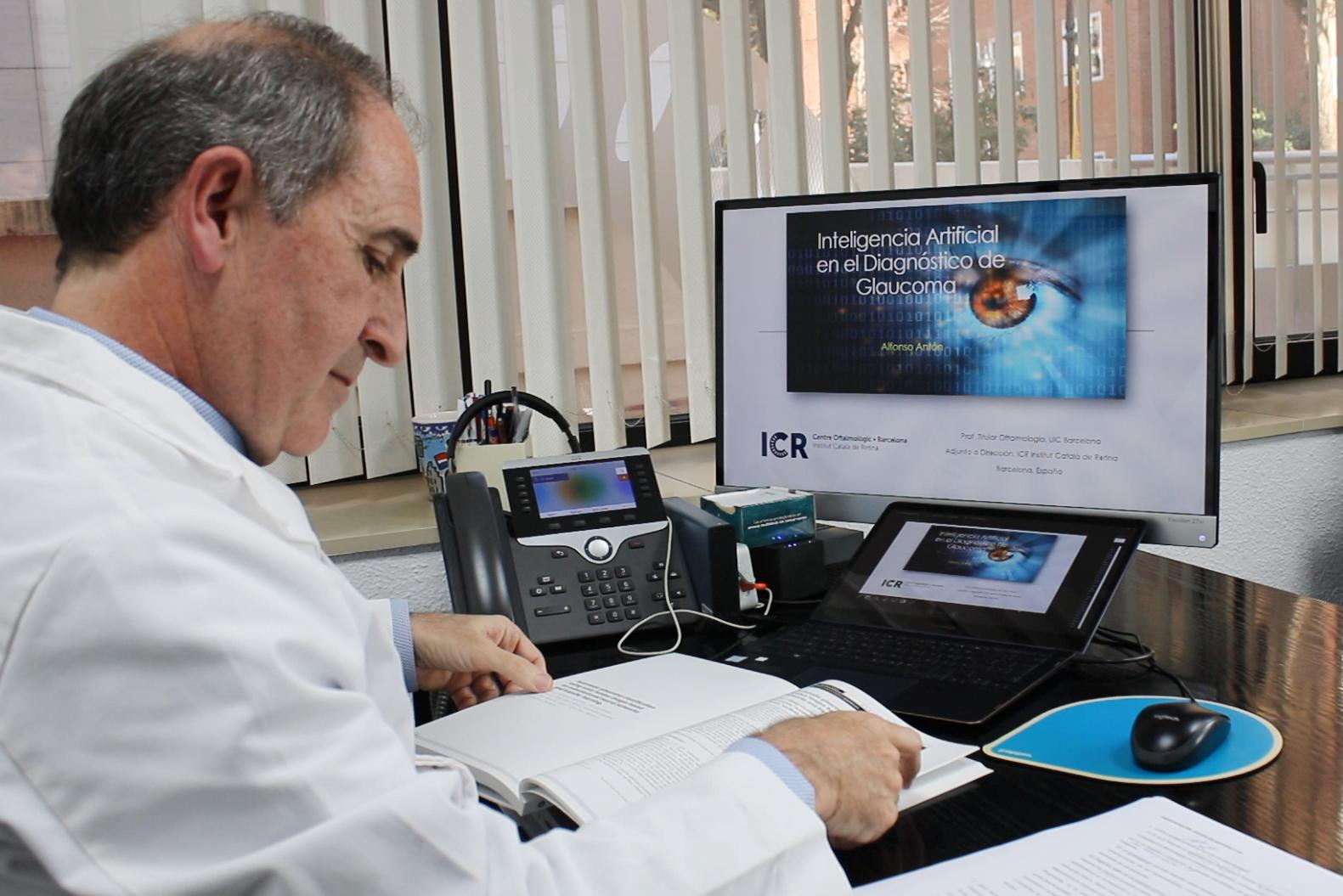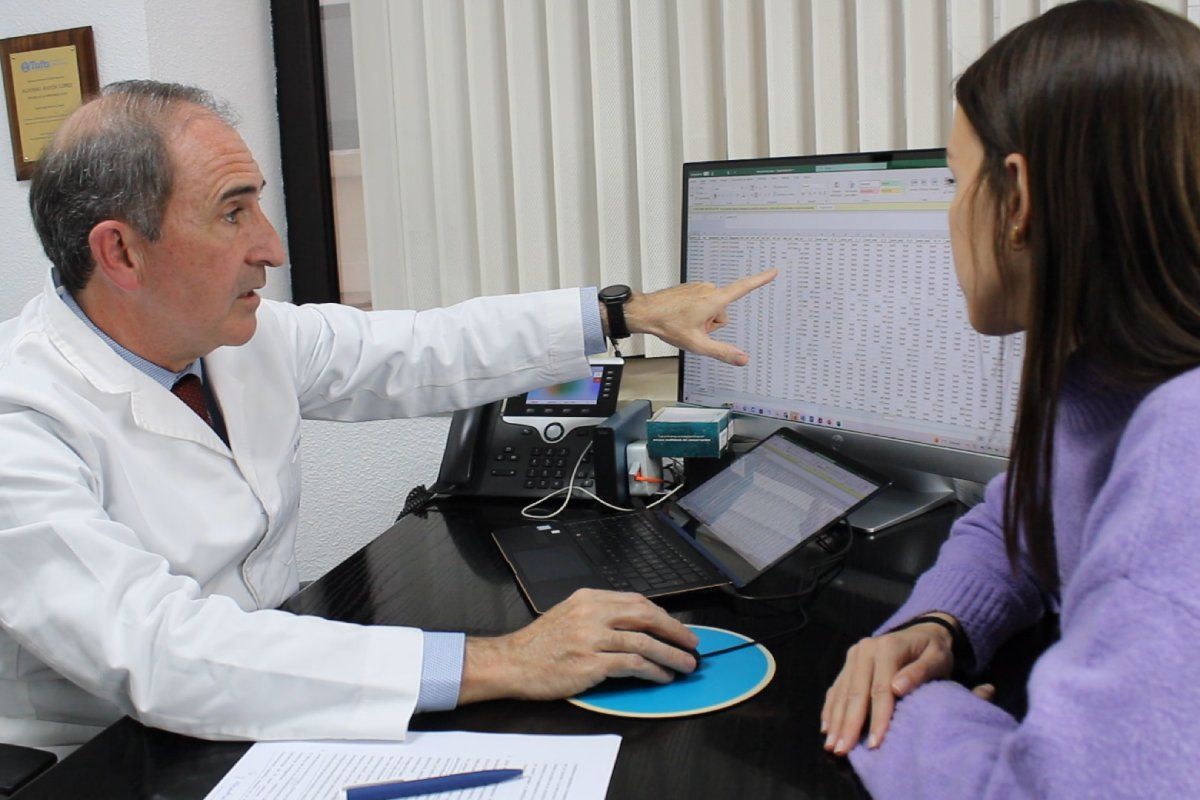
On the occasion of World Glaucoma Day, we interviewed Dr. Alfonso Antón, Head of the Glaucoma and Research Departments, who also leads research projects on this disease.
One of the latest trends in ophthalmology research, particularly in glaucoma, is the focus on artificial intelligence tools. AI applications in glaucoma detection have been studied for some time, but it seems that their use is now closer than ever.
The full interview can be watched here (in Spanish).
Artificial Intelligence is set to enhance research, clinical practice, and even the logistics of consultations in ophthalmology and medicine in general. While it may have other uses, for now, it is particularly useful in analyzing large amounts of clinical data and images.
In the field of research, AI enables the study of epidemiological data, the identification of disease characteristics, and even the estimation of the expected progression of patients.
In clinical practice, there are tools being developed that can classify tests and data, identify significant changes in progression, and even estimate future outcomes. These tools will be very useful in improving the diagnosis and monitoring of various diseases, making the work of ophthalmologists and other physicians easier.
AI can also play an important role in other aspects of medicine, some of which are already being applied today, such as optimizing the working system of clinics or transforming specialist and patient voices into organized text during clinical examinations.
In glaucoma care, AI can assist in all the mentioned aspects (research, clinical practice, and consultation dynamics). Additionally, due to the characteristics of the disease, certain applications currently being developed can be particularly useful, such as tools capable of distinguishing between the results of a person with or without glaucoma. These tools are highly effective in the precise and rapid classification of images.
Moreover, AI-powered tools will allow for the analysis of clinical data and test results over time for the same patient, determining whether they remain stable or worsen. Since glaucoma is a chronic disease, this application can be very useful for monitoring patients with the condition. I am convinced that Artificial Intelligence will help identify deterioration in a sensitive and reproducible manner.
Finally, in glaucoma, AI tools can be especially valuable in identifying whether the damage is in the function or structure of the optic nerve. This is something we do every day in consultations, and AI can assist ophthalmologists in determining whether the patient requires additional treatment or even surgery.

At ICR, we are developing two types of tools in collaboration with several universities across the country.
The first project focuses on the estimation of the future progression of glaucoma in specific patients. We are developing a tool that can indicate the likely progression for each patient over the coming years. The technology will be based on clinical data and tests used in the diagnosis and treatment of glaucoma, particularly OCT images of the optic nerve and visual field tests.
The second tool will help us decide the most appropriate treatment for each patient. We want this AI-powered tool to consider all data, factors, and even the activities of the patient in question. Again, this is something that glaucoma and ophthalmology specialists do many times each day, but it will be very useful to have a precise tool that can consider the progression of thousands of patients similar to the one being examined at that moment in a few seconds. With this extensive patient database and their response to each treatment, the tool will indicate the likelihood of success for each type of treatment for each patient, serving as a guide for ophthalmologists in prescribing individualized treatments and thus applying precision medicine.
The future of AI is undoubtedly bright and diverse. However, in medicine, researchers, doctors, and patients must demand that the tools are accurate, safe, and compatible with evidence-based scientific knowledge. Therefore, in the near future, the application of AI in medicine will be somewhat slower than in other fields. Any medical application must be thoroughly evaluated before being used on patients.
Although the advantages are innumerable and AI will certainly help us improve medical care in ophthalmology in general and glaucoma in particular, there are obviously limitations that must be aknowledged.
First of all, it is very important to feed artificial intelligence tools with good quality data. Otherwise, the tool that is developed will not work well.
Second, any clinical tool must be thoroughly evaluated with scientific methods.
Third, the decision algorithms of AI tools are not completely transparent. It is already possible to extract some knowledge from them, but there is still some way to go in that respect.
No, Artificial Intelligence will not replace doctors. However, it will assist us in the decision-making process for the proper care of our patients. AI will help us become better medical professionals, allowing us to have more time and make better clinical decisions. However, undoubtedly, we will need to learn how to use these tools.
AI will take over some more systematic tasks that, today, are performed by physicians. These tasks can be executed with greater speed and precision by a well-evaluated and approved tool than by a human being, no matter how well-trained.

Contact us or request an appointment with our medical team.